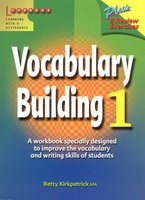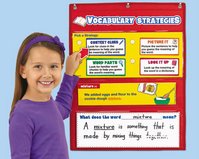











Everyone—from beginning learners in English to veterans in journalism—knows the frustration of not having the right word immediately available in that lexicon one carries between one's ears. Sometimes it's a matter of not being able to recall the right word; sometimes we never knew it. It is also frustrating to read a newspaper or homework assignment and
run across words whose meanings elude us. Language, after all, is power. When your children get in trouble fighting with the neighbors' children and your neighbors call your children little twerps and you call their children nefarious miscreants—well, the battle is over and they didn't stand a chance. Building a vocabulary that is adequate to the needs of one's reading and self-expression has to be a personal goal for every writer and speaker
Using some durable piece of paper—white construction paper or the insides of the ripped-off covers of old notebooks—begin to write down words in small but readable script that you discover in your reading that you can't define. Read journals and newspapers that challenge you in terms of vocabulary. Pursue words actively and become alert to words that you simply overlooked in the past. Write down the words in one column; then, later, when you have a dictionary at your disposal, write down a common definition of the word; in a third column, write a brief sentence using the word, underlined.
Carry this paper or cardboard with you always. In the pauses of your busy day—when you're sitting on the bus, in the dentist's office, during commercials—take out the paper and review your vocabulary words until you feel comfortable that you would recognize (and be able to use) these words the next time you see them. The amazing thing is that you will see the words again—even "nefarious miscreants," and probably sooner than you thought. In fact, you might well discover that the words you've written down are rather common. What's happening is not that, all of a sudden, people are using words you never saw before, but that you are now reading and using words that you had previously ignored
Most bookstores carry books on building a more powerful vocabulary, some of them with zany names such as Thirty Days to a More Powerful Vocabulary. If you've got money to spare or if they're on sale, buy them and use them; they can't hurt. Books that group words according to what they have in common—more in meaning than in spelling—are especially useful.
Newspapers often carry brief daily articles that explore the meanings of words and phrases. These articles often emphasize peculiar words that won't find themselves into your working vocabulary, but they can still be fun. Often you'll find that learning one new word leads to other new words, little constellations of meaning that keep your brain cells active and hungry for more. Make reading these articles one of your daily habits, an addiction, even.
Play dictionary games with your family in which someone uses the dictionary to find a neat word and writes down the real definition and everyone else writes down a fake (and funny) definition. See how many people you can fool with your fake definitions.
- http://www.readingrockets.org/article/9943
- http://grammar.ccc.commnet.edu/GRAMMAR/vocabulary.htm
- How to Teach Vocabulary by Creating a Monster text.doc 61k (version 1)
- How you can download videos related to your topic.ppt 2473k (version 1)
- Learner centerd teachang vocabulary text.doc 29k (version 1)
- a good exercise for teaching vocabulary.doc 149k (version 1)
- building vocabulary worksheets.doc (version 1)
- how to teach eng vocabulary items at primary level 2.ppt 8098k (version 1)
- lesson plan for higher level recep n prodc vocab.ppt 492k (version 1)
- sense relation text.doc 50k (version 1)
- teaching vocabulary with the help of images at beginners level.ppt (version 1)
- teach vocab wid d help of images 2 at beginners level.ppt 2869k - (version 1)
- teah vocab with d help of images 3 at beginners level.ppt 7271k (version 2 / earlier versions)
- text for receptv n productive vocab.doc 41k - (version 1)
- text hw to teach eng vocab at primary level.doc 122k - (version 1)
- ips to teach Vocabulary.doc 117k (version 1)

